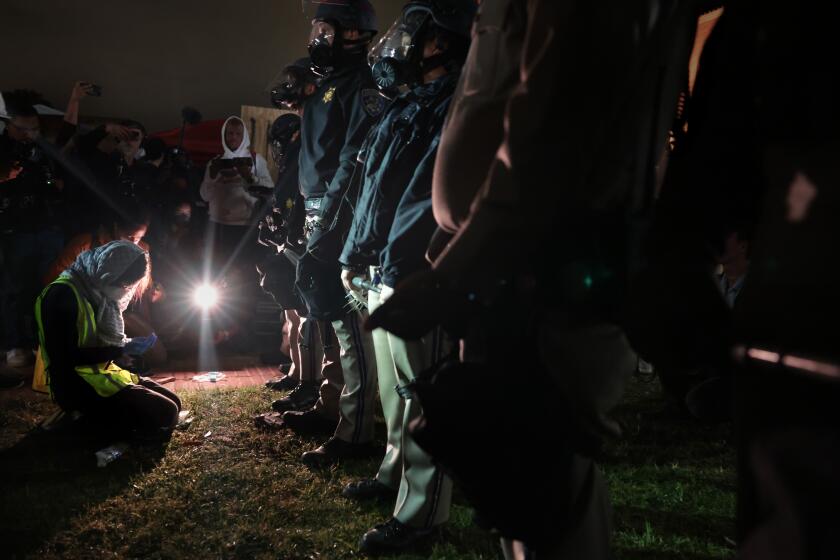
- Share via
Pro-Palestinian protests grew Thursday at California colleges and universities, including a new encampment at UCLA that drew a crowd of counterprotesters and a teach-in at UC Santa Barbara, a day after police in riot gear arrested 93 protesters at USC.
Fallout over the Israel-Hamas war grew Thursday as USC announced that it would cancel its main-stage commencement ceremony after more than a week of national controversy over its decision to pull a pro-Palestinian valedictorian’s speaking slot from the May event that was expected to draw 65,000 attendees.
The university cited new safety measures, saying that the “time needed to process the large number of guests coming to campus will increase substantially.”
Dozens of smaller graduation ceremonies and celebrations at USC will continue under a new ticket policy and security checks.
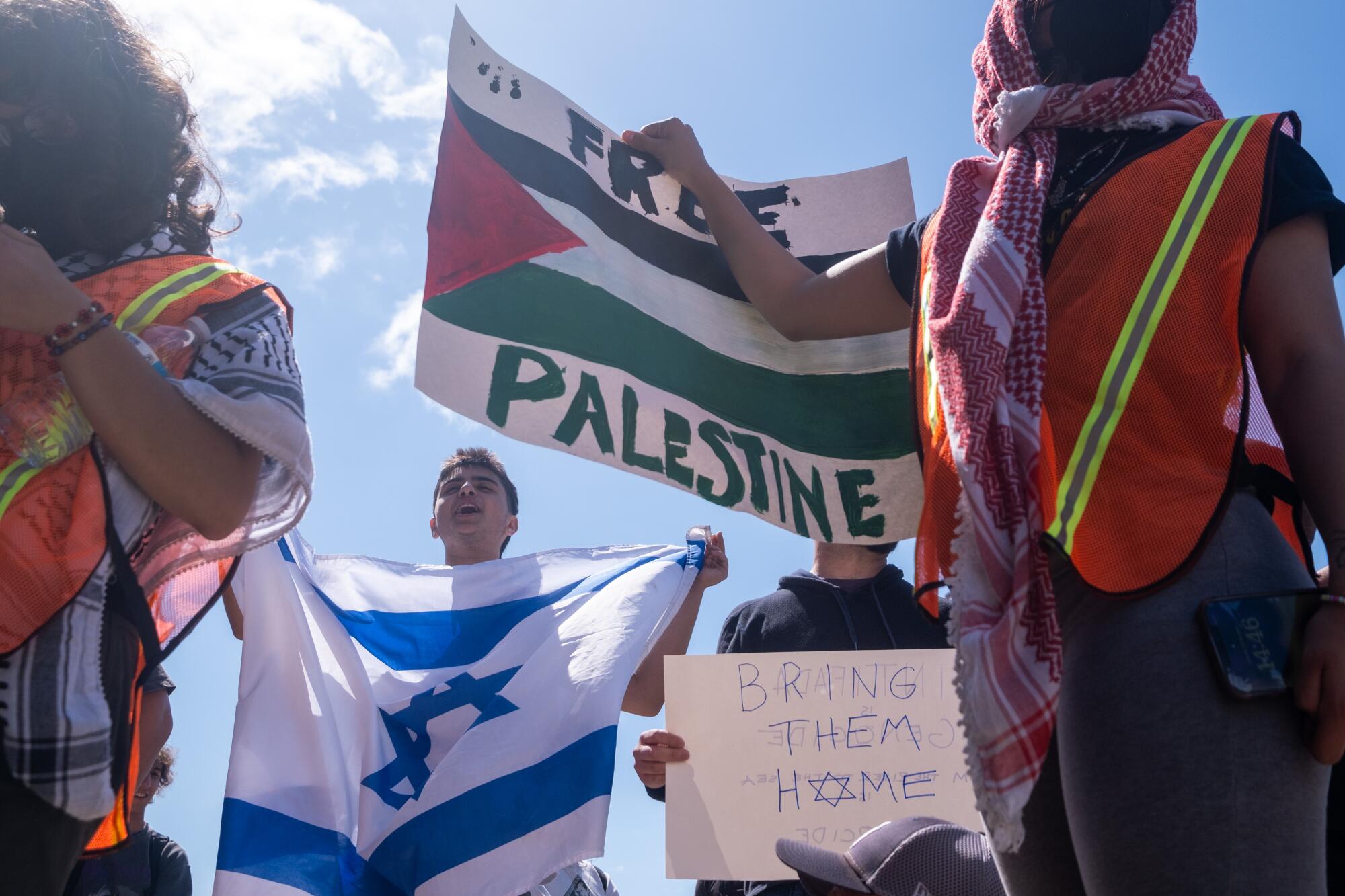
At Cal Poly Humboldt in Arcata, the campus remained closed and classes shifted online, with pro-Palestinian students occupying multiple buildings since Monday night.
And at UC Berkeley, at least 50 tents remained up by Sproul Hall, the historic home of the campus’ free speech movement. On their fourth day of a “Free Palestine Camp,” students called for the university to divest its endowment from weapons manufacturers tied to Israel. They joined a national wave of students who are camping out on college campuses to protest the treatment of Palestinians by the Israeli government and call for a cease-fire in the war.
After tensions led USC to drop its valedictorian and keynote speaker from its main commencement ceremony, the school canceled its largest graduation event.
New encampments continue to emerge. Students at Stanford University, where administrators have warned them against overnight camping, set up an array of tents Thursday evening.
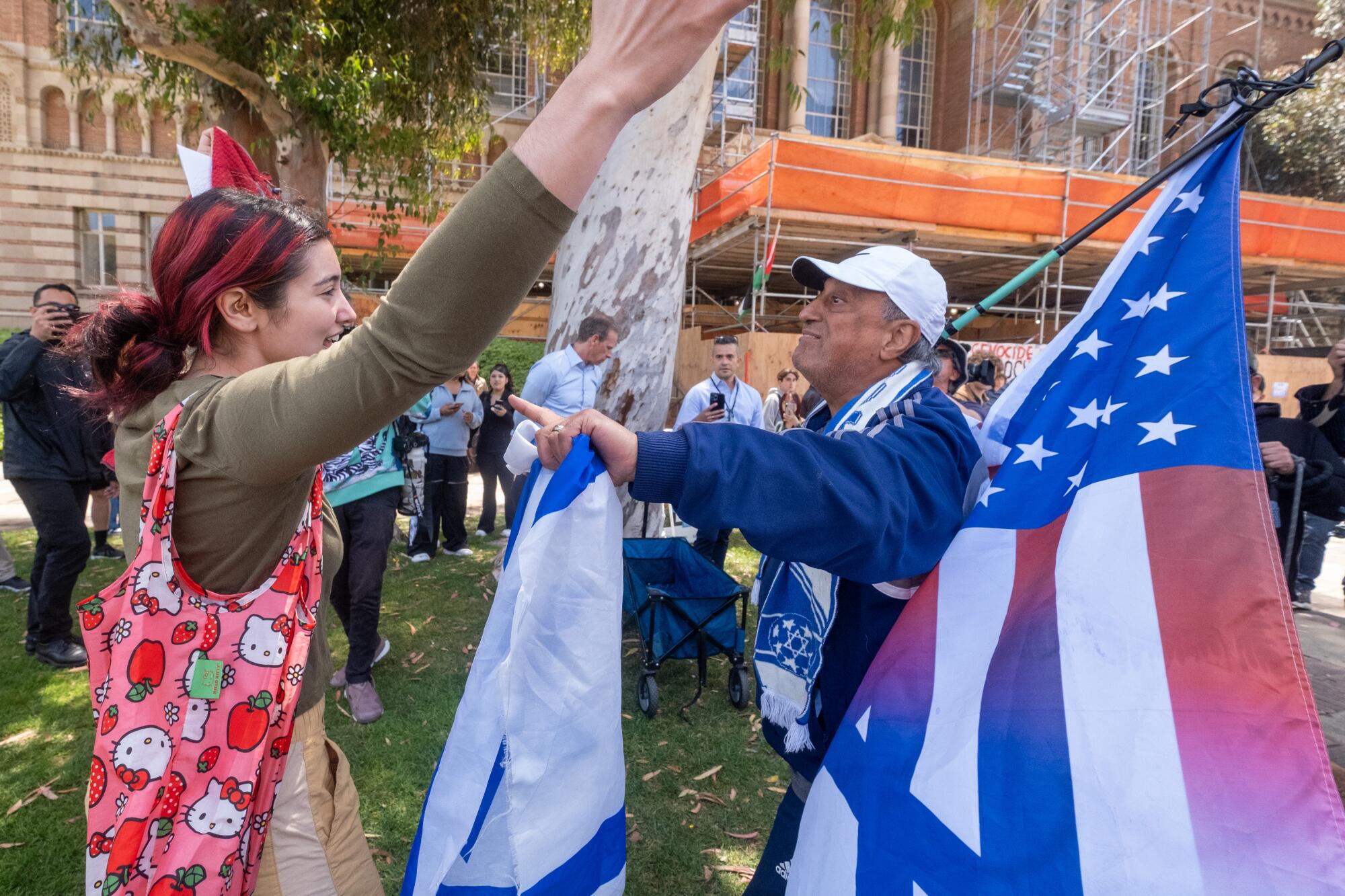
Meanwhile at UCLA, an encampment that was established early Thursday morning grew to hundreds of people. By the afternoon and late into the evening, the situation had become tense as pro-Palestinian protesters faced combative counter-protesters who breached the enclosed encampment and other demonstrators who chanted and danced by the camp’s boundaries. By evening, metal barricades were set up around the encampment’s north side to protect both sides.
Tensions were high at USC, where the campus was rocked at the end of the semester by President Carol Folt’s decision to cancel the valedictorian’s speech and then a commencement address by film director Jon M. Chu, before calling off the main commencement altogether.
An encampment that launched before sunrise Wednesday morning at Alumni Park grew to about 200 protesters — students, faculty and outsiders — before the late-night arrests by Los Angeles police. By Thursday morning, the encampment had been cleared, with campus security picking up the remaining tents and signs.
As pro-Palestinian protests grow at California colleges and universities, counterprotesters spark clashes at UCLA.
On Thursday, the university fenced off the park — the site of the called-off commencement — to set up a brunch for 2024 graduates scheduled for Friday morning. There were no protesters and few signs of Wednesday’s unrest besides chalk messages on nearby sidewalks in support of Palestinians.
The campus remains closed to the public through the weekend, and professors have moved classes online. Many students and faculty members have condemned the university’s response to call in LAPD officers, saying their presence escalated tensions as they sought to force protesters and onlookers off campus.

“This is a series of poor decisions by USC, from banning the valedictorian to calling in police to arrest peaceful students,” said Luke, a USC sophomore who was arrested Wednesday night and released early Thursday morning. “I don’t know what this university thinks it’s doing, because none of it makes sense.”
Luke did not share his last name because he said he was worried about his safety and repercussions for his enrollment at USC, where campus safety officers Wednesday told students that they could face discipline for violating rules over camping and use of amplified sound.
Scrapping graduation traditions, officials call off appearances by Billie Jean King, director Jon M. Chu and more, after canceling Valedictorian Asna Tabassum’s speech amid controversy.
One Palestinian American student, who did not want to be named due to safety concerns, said some pushback was expected, but not the clashes involving campus safety officers and the LAPD.
“We did not expect it to happen so quickly and so violently, especially with [USC Department of Public Safety officers], who are not LAPD, and can’t be physically assaulting us when they came in,” the student said. “We were not expecting that. But again, the reason we’re here is for Gaza. It’s for Palestine. At the end of the day, the things happening to us, and what they did to us yesterday, is nothing compared to a genocide, to occupation, to apartheid.”
Amelia Jones, a professor at the Roski School of Art and Design who joined faculty in protesting on Wednesday, said there was a growing “lack of trust” at USC among the administration, faculty and students.
“They just massively escalated by calling in LAPD,” she said.
A Jewish community group condemned the USC protests, while a Muslim civil rights group condemned the arrests.
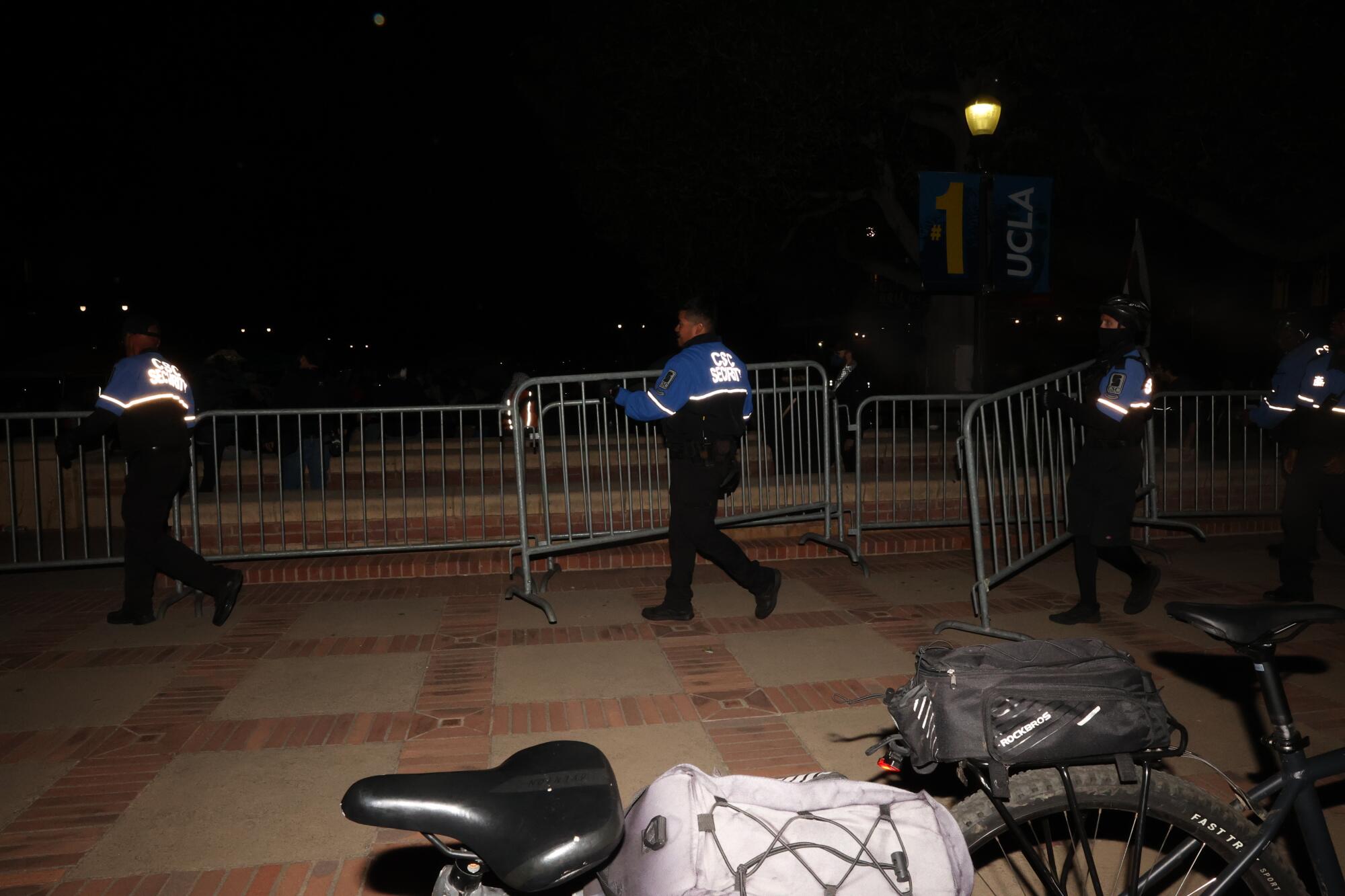
“While students have a right to protest, they do not have the right to intimidate or threaten Jewish students,” said a statement from USC’s Hillel. “Today’s events on campus included a protest action that again employed antisemitic chants including ‘there is only one solution, intifada revolution’ and ‘long live the intifada.’ These actions reflect a disturbing and quickly escalating situation nationally and on our own campus at USC.”
On Wednesday, a smattering of protesters gathered by the landmark Tommy Trojan statue, some calling on USC President Carol Folt to reverse course as arguments broke out between those on opposing sides.
In another statement, the Los Angeles chapter of the Council on American-Islamic Relations spoke out against the arrests of peaceful protesters.
“It is deeply concerning that USC’s response to students demonstrating peacefully in solidarity with Palestine is forcible suppression of free speech and assembly,” said CAIR-LA legal director Amr Shabaik. “This mirrors a nationwide trend of colleges and universities attempting to censor pro-Palestine advocacy on campuses.”
At UCLA, faculty, staff and alumni occupied the “Palestine Solidarity Encampment” on Thursday. The crowd fluctuated throughout the day but at times was hundreds strong. By the afternoon, chants and drumming filled the air as protesters began to clash with counterprotesters. A line of private security guards in blue uniforms with bicycles began to separate the two groups.
Security officers asked the counterprotesters to leave at 7 p.m., but they only moved from the front of the encampment to the side of it.
“Rape is not resistance,” several counterprotesters chanted, in reference to sexual violence some Hamas militants committed, according to independent accounts, during their Oct. 7 attack on Israel. A group raised a banner that read “No Mas Hamas.”
Counterprotesters focused their message against Hamas and in favor of freeing Israeli hostages. Students in the encampment chanted “Free Palestine” and other antiwar messages, along with the more controversial “intifada” and “from the river to the sea, Palestine will be free.”
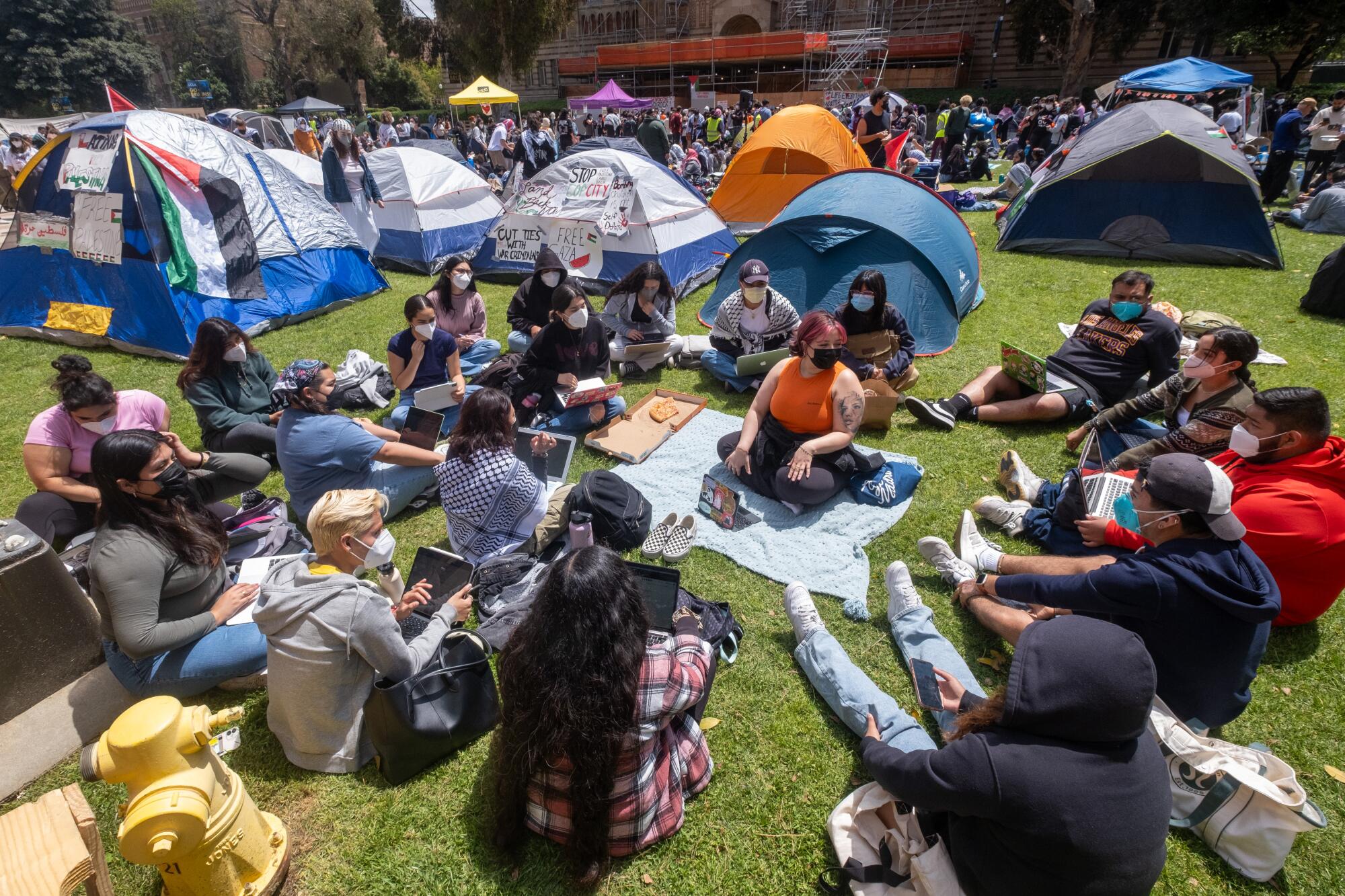
One counterprotester bounced her middle finger along to the chants, directing the gesture at encampment occupants. A video online showed a counterprotester violently pushing a woman down.
The pro-Palestinian protest was organized by UC Divest Coalition, which is made up of several student groups.
Outside Royce Hall, students and others stood in line to check in before entering the encampment.
Participants said they had seen minimal police presence — mostly officers passing by in squad cars, an apparent contrast to the encampment at USC. The LAPD confirmed its officers were not involved in policing the demonstration.
As sprawling pro-Palestinian protests and encampments escalate on university campuses across the United States, administrators respond with more discipline.
Marie Salem, 28, a graduate student studying public health, said the encampment is a community of people demanding a change from UC administrators.
“It’s about our community realizing that we no longer can go to a university that is complicit in genocide, and we no longer can go to a university that is invested in this genocide of the Gazans,” Salem said.
UCLA is actively monitoring the situation “to support a peaceful campus environment that respects our community’s right to free expression while minimizing disruption to our teaching and learning mission,” said Mary Osako, the university’s vice chancellor for strategic communications.
George Dutton, a professor of Asian language and cultures, said he and others wanted to observe the protest to ensure that students can safely practice their 1st Amendment rights.
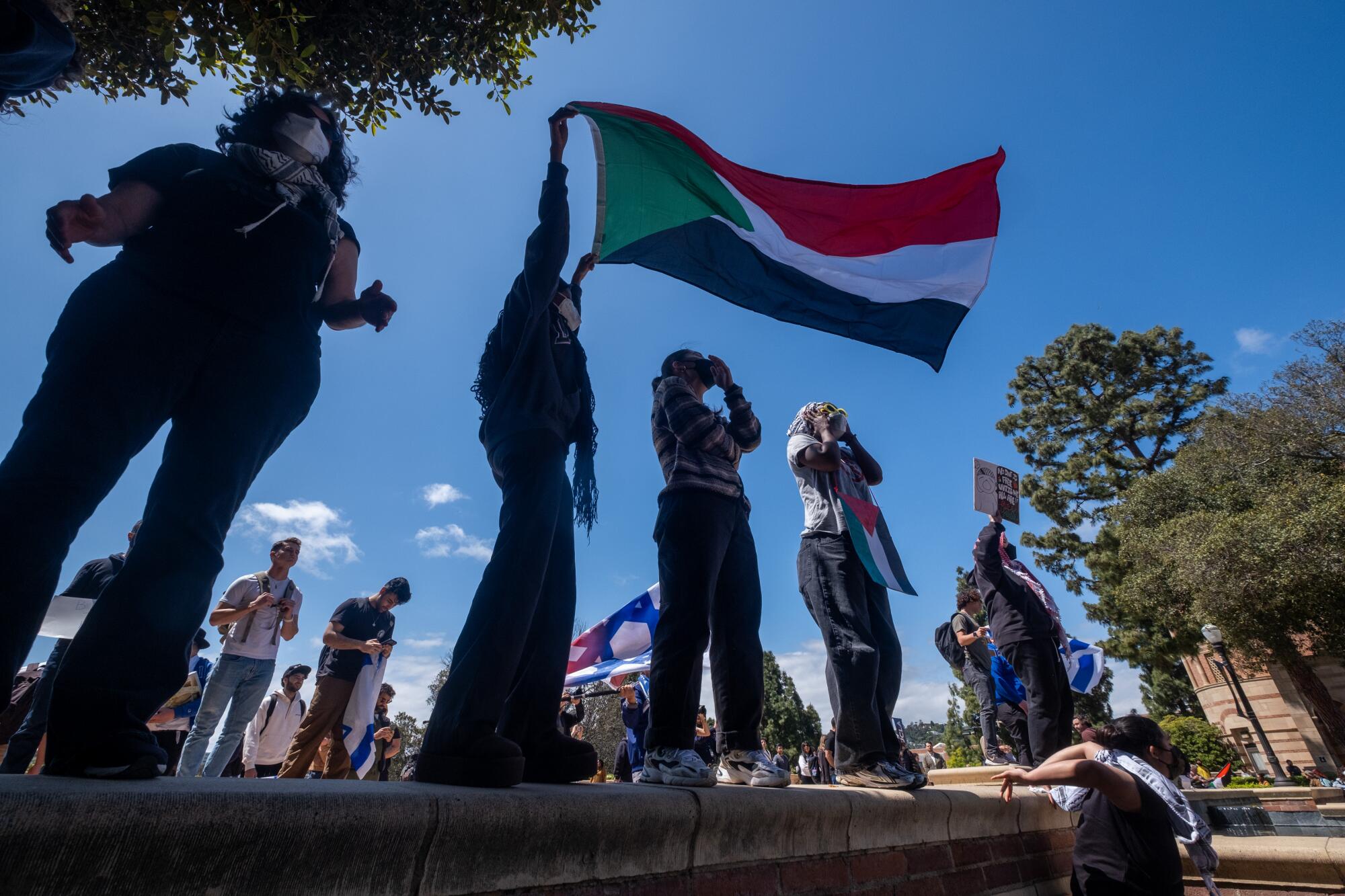
Dutton said it was “deeply disturbing” to see a large police presence on campuses across America this week as students protest the war in Gaza.
By 4 p.m., dozens of students and other protesters sat and stood in a circle inside the encampment to hold a Passover Seder. Nearby, on the southeast corner of the encampment, a group of Jewish and other counterprotesters holding and wearing Israeli flags debated with those inside the encampment.
Assemblymember Rick Chavez Zbur (D-Los Angeles), whose district includes the UCLA campus, criticized the encampment and said that while he supports freedom of speech, he was “appalled and disgusted” by what he said were antisemitic and xenophobic chants.
“No group should have to endure hate on campus, and there is no place for this vile hate in Los Angeles,” Zbur said. “I stand firmly with Jewish students and their peers who had to endure these hateful actions during Passover — and for months now on campuses across the country.”
Encampments and protests took place at UC Berkeley and Cal Poly Humboldt, and plans were shaping up for more pro-Palestinian protests at California colleges and universities.
At UC Santa Barbara, hundreds occupied the student resources building Thursday for a daylong series of workshops, art projects and other actions to express solidarity with Palestinians, call for a cease-fire and demand an end to Israel-related investments.
A few tents were set up inside the building, but no encampment is planned, said Bishnupriya Ghosh, a professor of English and global studies and member of Academics for Justice in Palestine. She added that no police were present, and the event was proceeding peacefully.
“It’s centered around education about Israel-Palestine, as well as antisemitism, Islamophobia and other forms of racism and hate,” Ghosh said.
Times staff writers Jenny Jarvie and Teresa Watanabe contributed to this report.
More to Read
Sign up for Essential California
The most important California stories and recommendations in your inbox every morning.
You may occasionally receive promotional content from the Los Angeles Times.

